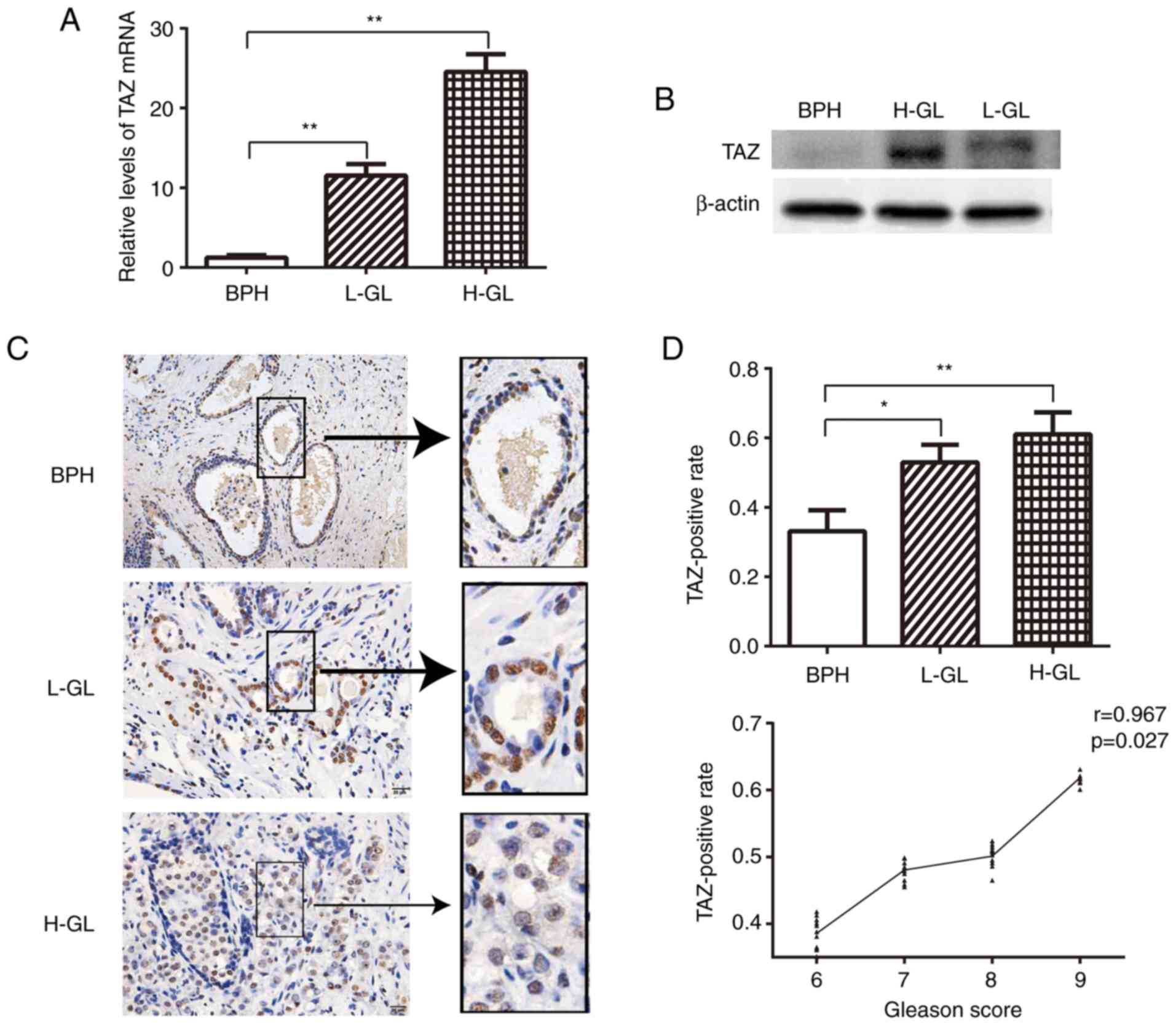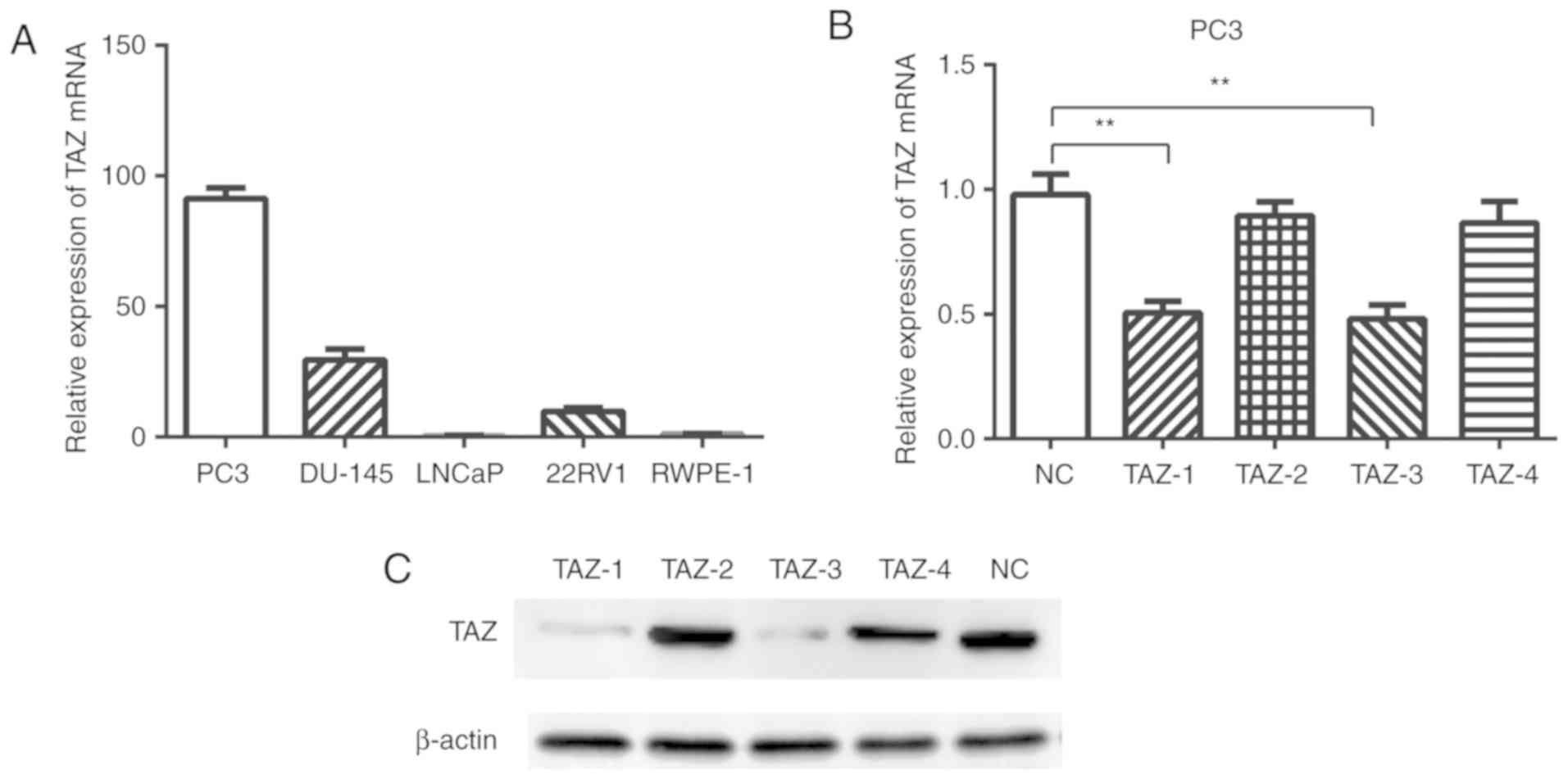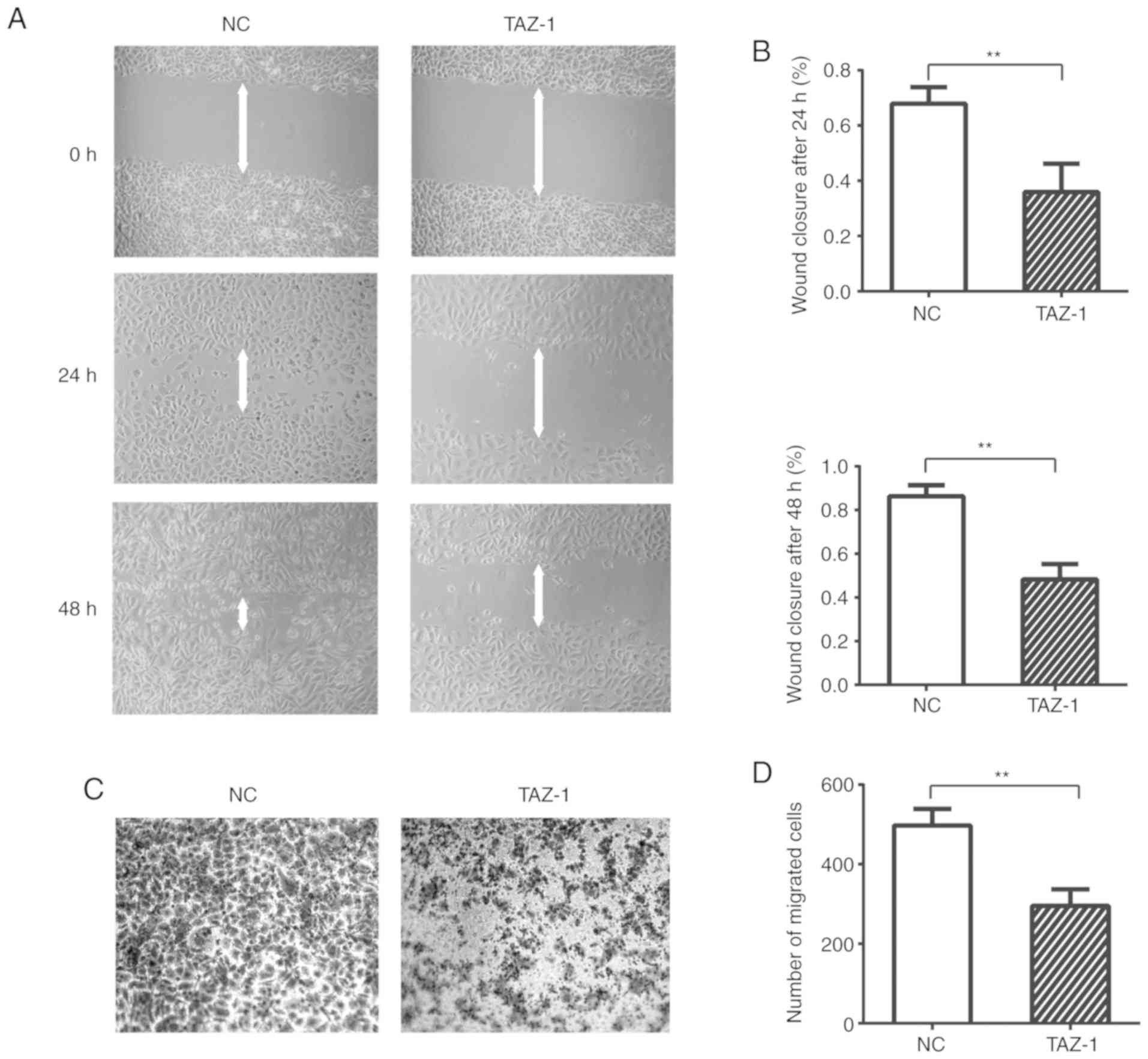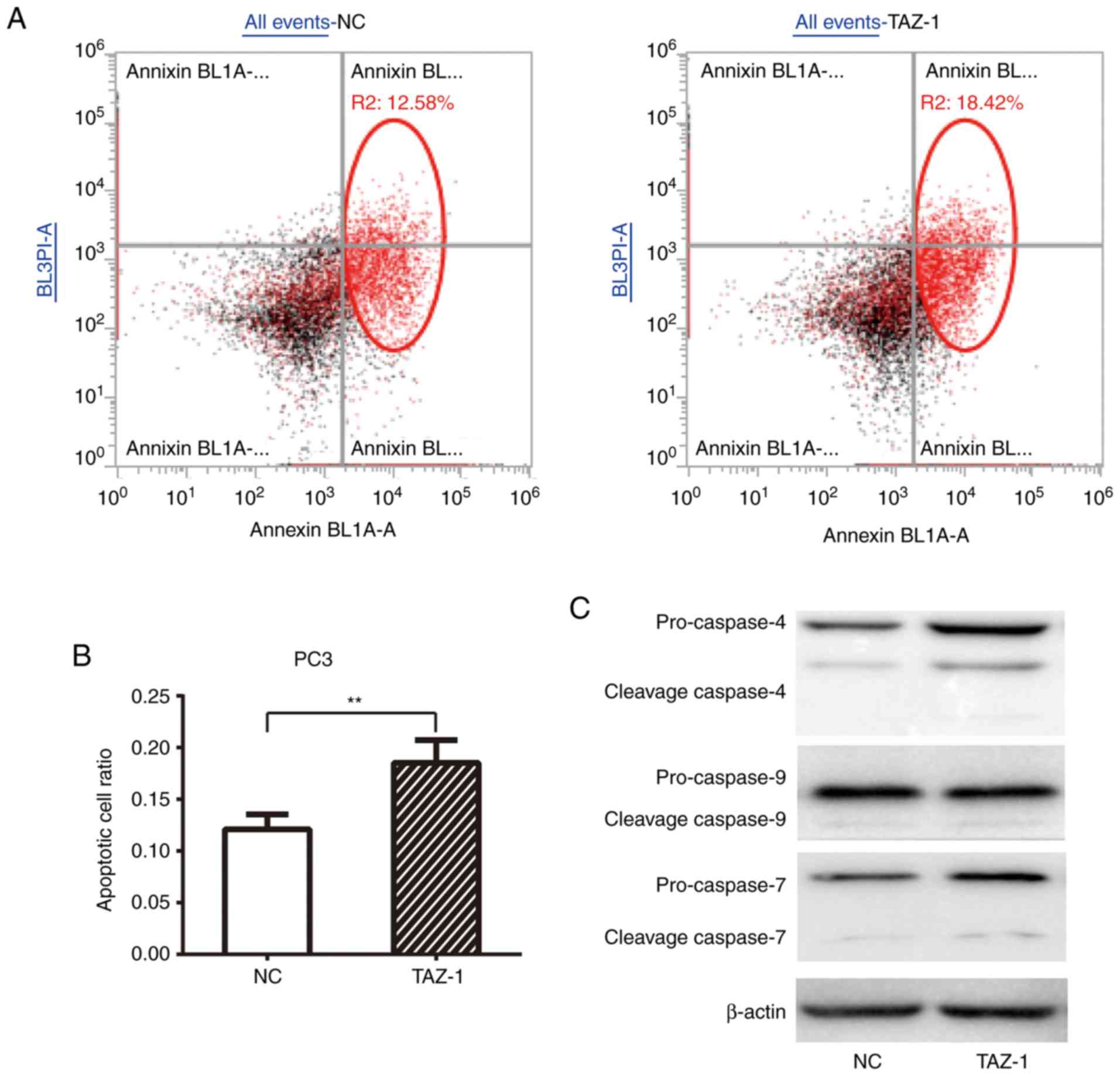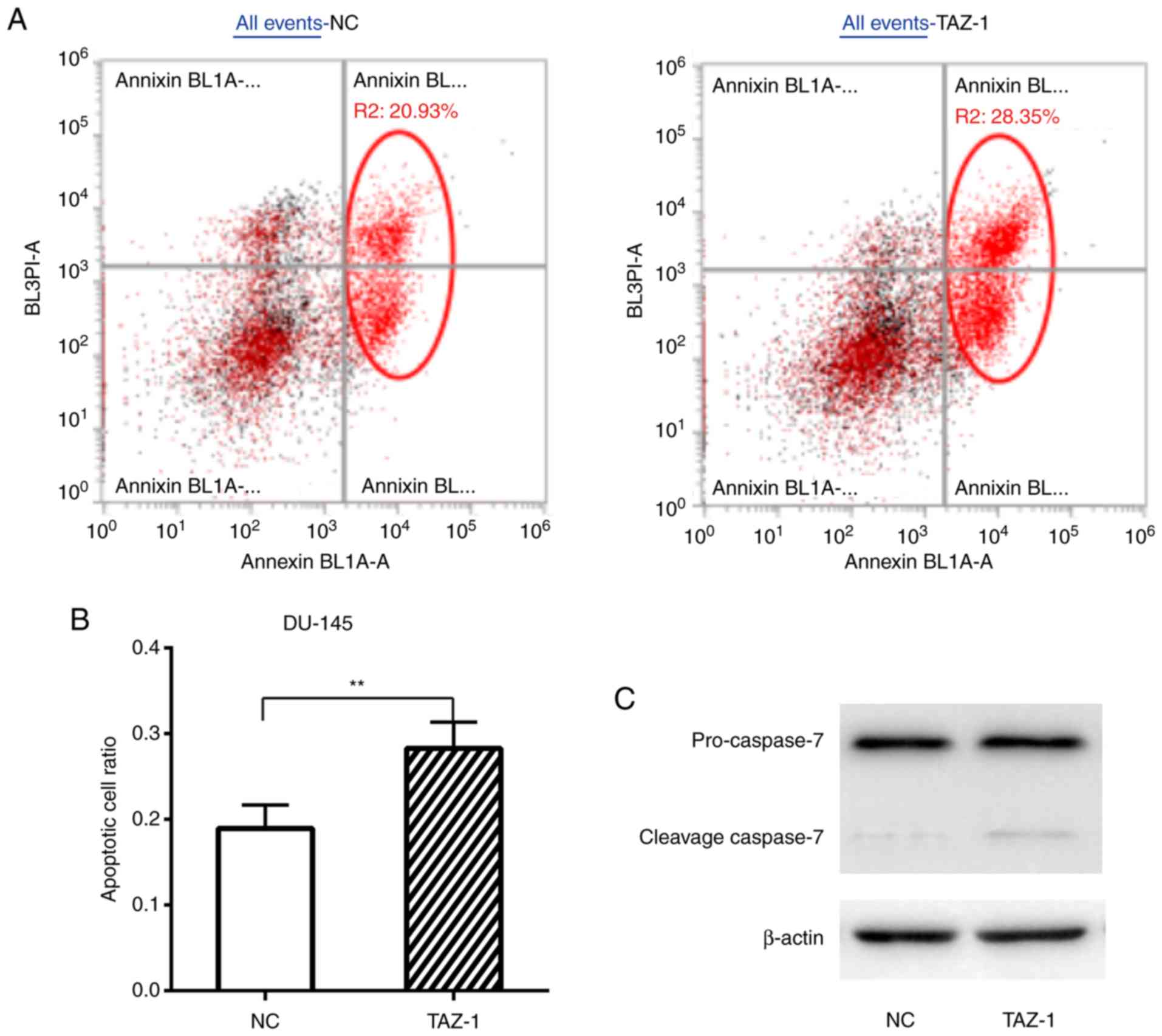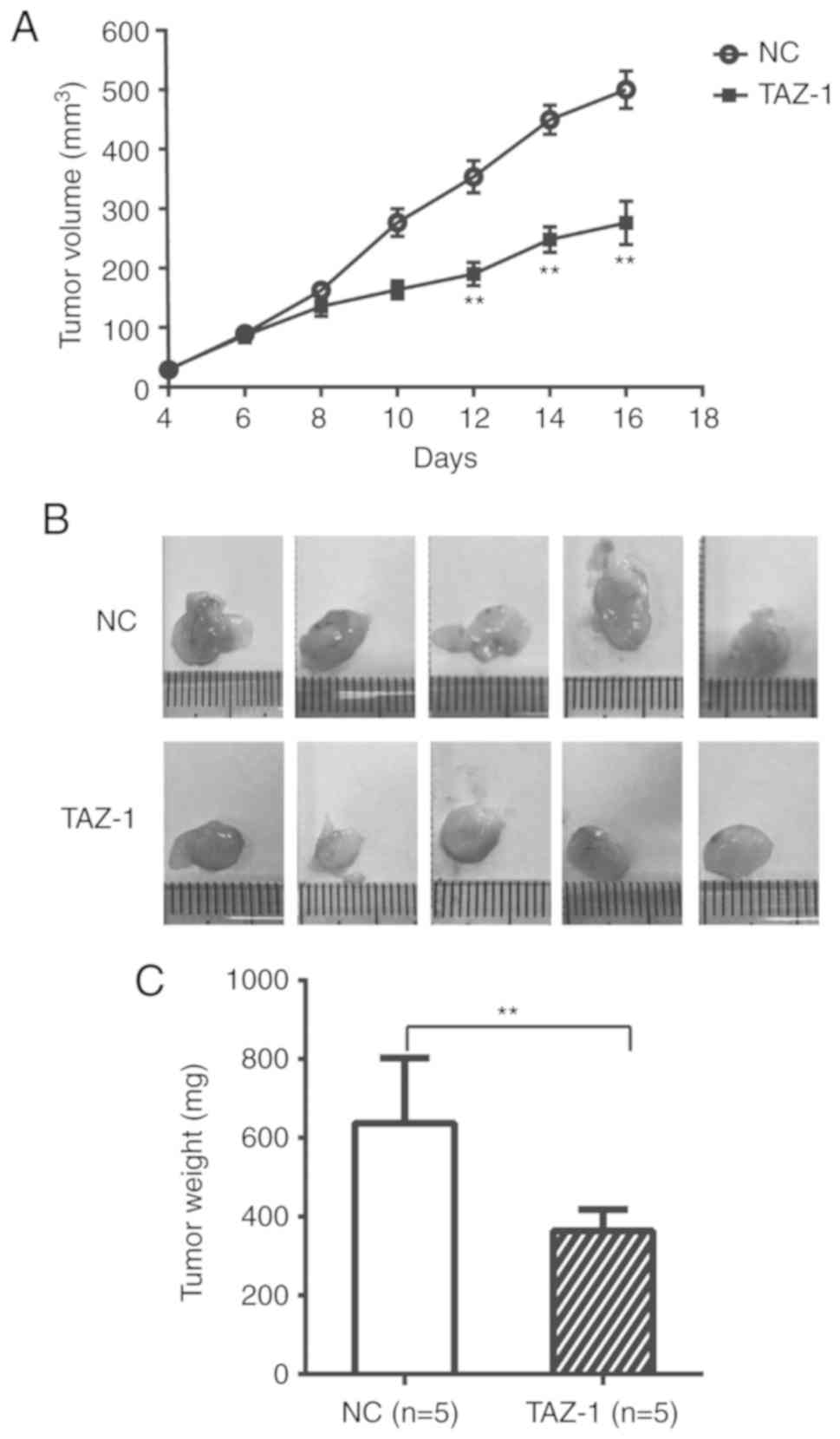|
1
|
Chen W, Zheng R, Baade PD, Zhang S, Zeng
H, Bray F, Jemal A, Yu XQ and He J: Cancer statistics in China,
2015. CA Cancer J Clin. 66:115–132. 2016. View Article : Google Scholar : PubMed/NCBI
|
|
2
|
Pullar B and Shah N: Prostate cancer.
Surgery (Oxford). 34:505–511. 2016. View Article : Google Scholar
|
|
3
|
Chaitoff A, Killeen TC and Nielsen C:
Men's health 2018: BPH, prostate cancer, erectile dysfunction,
supplements. Cleve Clin J Med. 85:871–880. 2018. View Article : Google Scholar : PubMed/NCBI
|
|
4
|
Kanai F, Marignani PA, Sarbassova D, Yagi
R, Hall RA, Donowitz M, Hisaminato A, Fujiwara T, Ito Y, Cantley LC
and Yaffe MB: TAZ: A novel transcriptional co-activator regulated
by interactions with 14-3-3 and PDZ domain proteins. EMBO J.
19:6778–6791. 2000. View Article : Google Scholar : PubMed/NCBI
|
|
5
|
Santucci M, Vignudelli T, Ferrari S, Mor
M, Scalvini L, Bolognesi ML, Uliassi E and Costi MP: The Hippo
pathway and YAP/TAZ-TEAD protein-protein interaction as targets for
regenerative medicine and cancer treatment. J Med Chem.
58:4857–4873. 2015. View Article : Google Scholar : PubMed/NCBI
|
|
6
|
Brusatin G, Panciera T, Gandin A, Citron A
and Piccolo S: Biomaterials and engineered microenvironments to
control YAP/TAZ-dependent cell behaviour. Nat Mater. 17:1063–1075.
2018. View Article : Google Scholar : PubMed/NCBI
|
|
7
|
Meng Z, Moroishi T and Guan KL: Mechanisms
of hippo pathway regulation. Genes Dev. 30:1–17. 2016. View Article : Google Scholar : PubMed/NCBI
|
|
8
|
Yuen HF, McCrudden CM, Huang YH, Tham JM,
Zhang X, Zeng Q, Zhang SD and Hong W: TAZ expression as a
prognostic indicator in colorectal cancer. PLoS One. 8:e542112013.
View Article : Google Scholar : PubMed/NCBI
|
|
9
|
Bhat KP, Salazar KL, Balasubramaniyan V,
Wani K, Heathcock L, Hollingsworth F, James JD, Gumin J, Diefes KL,
Kim SH, et al: The transcriptional coactivator TAZ regulates
mesenchymal differentiation in malignant glioma. Genes Dev.
25:2594–2609. 2011. View Article : Google Scholar : PubMed/NCBI
|
|
10
|
Chen G, Xie J, Huang P and Yang Z:
Overexpression of TAZ promotes cell proliferation, migration and
epithelial-mesenchymal transition in ovarian cancer. Oncol Lett.
12:1821–1825. 2016. View Article : Google Scholar : PubMed/NCBI
|
|
11
|
Jeong GO, Shin SH, Seo EJ, Kwon YW, Heo
SC, Kim KH, Yoon MS, Suh DS and Kim JH: TAZ mediates
lysophosphatidic acid-induced migration and proliferation of
epithelial ovarian cancer cells. Cell Physiol Biochem. 32:253–263.
2013. View Article : Google Scholar : PubMed/NCBI
|
|
12
|
Lei QY, Zhang H, Zhao B, Zha ZY, Bai F,
Pei XH, Zhao S, Xiong Y and Guan KL: TAZ promotes cell
proliferation and epithelial-mesenchymal transition and is
inhibited by the hippo pathway. Mol Cell Biol. 28:2426–2436. 2008.
View Article : Google Scholar : PubMed/NCBI
|
|
13
|
Chan SW, Lim CJ, Guo K, Ng CP, Lee I,
Hunziker W, Zeng Q and Hong W: A role for TAZ in migration,
invasion, and tumorigenesis of breast cancer cells. Cancer Res.
68:2592–2598. 2008. View Article : Google Scholar : PubMed/NCBI
|
|
14
|
Moroishi T, Hansen CG and Guan KL: The
emerging roles of YAP and TAZ in cancer. Nat Rev Cancer. 15:73–79.
2015. View
Article : Google Scholar : PubMed/NCBI
|
|
15
|
Zhang Y, Xue C, Cui H and Huang Z: High
expression of TAZ indicates a poor prognosis in retinoblastoma.
Diagn Pathol. 10:1872015. View Article : Google Scholar : PubMed/NCBI
|
|
16
|
Malik SA, Khan MS, Dar M, Hussain MU and
Mudassar S: TAZ is an independent prognostic factor in non-small
cell lung carcinoma: Elucidation at protein level. Cancer Biomark.
18:389–395. 2017. View Article : Google Scholar : PubMed/NCBI
|
|
17
|
Wang Y, Xu X, Maglic D, Dill MT, Mojumdar
K, Ng PK, Jeong KJ, Tsang YH, Moreno D, Bhavana VH, et al:
Comprehensive molecular characterization of the hippo signaling
pathway in cancer. Cell Rep. 25:1304–1317. 2018. View Article : Google Scholar : PubMed/NCBI
|
|
18
|
Mills GB and Moolenaar WH: The emerging
role of lysophosphatidic acid in cancer. Nat Rev Cancer. 3:582–591.
2003. View
Article : Google Scholar : PubMed/NCBI
|
|
19
|
Na Y, Ye Z, Sun Y and Sun G: Guidelines
for Diagnosis and Treatment of Urology in China (2014). Peoples
Medical Publishing House. 2013.
|
|
20
|
Livak KJ and Schmittgen TD: Analysis of
relative gene expression data using real-time quantitative PCR and
the 2(-Delta DeltaC(T)) method. Methods. 25:402–408. 2001.
View Article : Google Scholar : PubMed/NCBI
|
|
21
|
Wei J, Wang L, Zhu J, Sun A, Yu G, Chen M,
Huang P, Liu H, Shao G, Yang W and Lin Q: The Hippo signaling
effector WWTR1 is a metastatic biomarker of gastric cardia
adenocarcinoma. Cancer Cell Int. 19:742019. View Article : Google Scholar : PubMed/NCBI
|
|
22
|
Liu N, Mei L, Fan X, Tang C, Ji X, Hu X,
Shi W, Qian Y, Hussain M, Wu J, et al: Phosphodiesterase 5/protein
kinase G signal governs stemness of prostate cancer stem cells
through hippo pathway. Cancer Lett. 378:38–50. 2016. View Article : Google Scholar : PubMed/NCBI
|
|
23
|
Dogruluk T, Tsang YH, Espitia M, Chen F,
Chen T, Chong Z, Appadurai V, Dogruluk A, Eterovic AK, Bonnen PE,
et al: Identification of variant-specific functions of PIK3CA by
rapid phenotyping of rare mutations. Cancer Res. 75:5341–5354.
2015. View Article : Google Scholar : PubMed/NCBI
|
|
24
|
Zhao B, Ye X, Yu J, Li L, Li W, Li S, Yu
J, Lin JD, Wang CY, Chinnaiyan AM, et al: TEAD mediates
YAP-dependent gene induction and growth control. Genes Dev.
22:1962–1971. 2008. View Article : Google Scholar : PubMed/NCBI
|
|
25
|
Holden JK and Cunningham CN: Targeting the
hippo pathway and cancer through the TEAD family of transcription
factors. Cancers (Basel). 10:102018.
|
|
26
|
Hayashi H, Higashi T, Yokoyama N, Kaida T,
Sakamoto K, Fukushima Y, Ishimoto T, Kuroki H, Nitta H, Hashimoto
D, et al: An imbalance in TAZ and YAP expression in hepatocellular
carcinoma confers cancer stem cell-like behaviors contributing to
disease progression. Cancer Res. 75:4985–4997. 2015. View Article : Google Scholar : PubMed/NCBI
|
|
27
|
Sakai Y, Balam TA, Kuroda S, Tamamura N,
Fukunaga T, Takigawa M and Takano-Yamamoto T: CTGF and apoptosis in
mouse osteocytes induced by tooth movement. J Dent Res. 88:345–350.
2009. View Article : Google Scholar : PubMed/NCBI
|
|
28
|
Kireeva ML, Mo FE, Yang GP and Lau LF:
Cyr61, a product of a growth factor-inducible immediate-early gene,
promotes cell proliferation, migration, and adhesion. Mol Cell
Biol. 16:1326–1334. 1996. View Article : Google Scholar : PubMed/NCBI
|
|
29
|
Hou Y, Lan C, Kong Y, Zhu C, Peng W, Huang
Z and Zhang C: Genetic ablation of TAZ induces HepG2 liver cancer
cell apoptosis through activating the CaMKII/MIEF1 signaling
pathway. Onco Targets Ther. 12:1765–1779. 2019. View Article : Google Scholar : PubMed/NCBI
|
|
30
|
Xiao H, Tong R, Yang B, Lv Z, Du C, Peng
C, Ding C, Cheng S, Zhou L, Xie H, et al: TAZ regulates cell
proliferation and sensitivity to vitamin D3 in intrahepatic
cholangiocarcinoma. Cancer Lett. 381:370–379. 2016. View Article : Google Scholar : PubMed/NCBI
|
|
31
|
Furth N, Aylon Y and Oren M: p53 shades of
hippo. Cell Death Differ. 25:81–92. 2018. View Article : Google Scholar : PubMed/NCBI
|
|
32
|
Su X, Napoli M, Abbas HA, Venkatanarayan
A, Bui NHB, Coarfa C, Gi YJ, Kittrell F, Gunaratne PH, Medina D, et
al: TAp63 suppresses mammary tumorigenesis through regulation of
the hippo pathway. Oncogene. 36:2377–2393. 2017. View Article : Google Scholar : PubMed/NCBI
|
|
33
|
Ji K, Lin K, Wang Y, Du L, Xu C, He N,
Wang J, Liu Y and Liu Q: TAZ inhibition promotes IL-2-induced
apoptosis of hepatocellular carcinoma cells by activating the
JNK/F-actin/mitochondrial fission pathway. Cancer Cell Int.
18:1172018. View Article : Google Scholar : PubMed/NCBI
|















